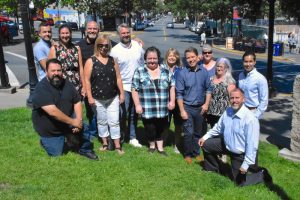Dear CUPE members in the community health sector,
As the province responds to the COVID-19 public health emergency, the Provincial Health Officer has issued orders and the BCCDC and Ministry of Health continue to provide more information which we can share with you. This information has been updated today, is summarized in this bulletin and is posted in greater detail on our frequently updated COVID-19 FAQ page.
NEW INFORMATION:
Critical Public Service (“essential”) workers and your rights
We have clarified what it means to be deemed an “essential” or critical public service worker. Working in this sector, you are more than likely deemed a critical worker (“essential”). What this means is that you are expected to be at work, unless your manager approves that you work from home or take a leave (unpaid or otherwise). Extenuating circumstances, such as the need for dependent care (child or elder), must be supported by clear documentation.
Advice for members who are pregnant
The BCCDC and Ministry of Health have determined that pregnant women are not at greater risk of acquiring COVID-19, nor are they at greater risk of severe symptoms than comparable aged persons. If you are pregnant, we encourage you to consult with your primary care provider on whether you should remain in your current role or be accommodated to work in a low-risk setting or work from home. Supportive documentation from your primary care provider will be required to seek the approval of an accommodation from your manager/accommodations department.
Childcare
At this time, childcare providers and schools that provide care and/or in-class instruction have been instructed to prioritize placements for those children whose parents are employed as ‘Tier 1’ essential service employees, a field that includes front-line health care as well as social services, law enforcement, first responders and emergency response.
With spring break now concluded, the Province is partnering with health authorities as of this week (March 30) to assist ‘Tier 1’ workers in accessing childcare on an urgent need basis. If you are someone in this position, please take the following steps:
- If your children are school-aged (Kindergarten to Grade 6), contact their school principal as soon as possible to determine how best to meet the need for urgent childcare beginning this week.
- If your children are non-school aged, contact childcare providers that operate on their school grounds to see if they have the capacity, or call their local Childcare Resource and Referral (CCRR) Centre and they will work to match front-line health care workers with a child care provider that has available space.
For parents with school-aged children, here are the links to the school districts:
Vancouver (City of Vancouver Info, they are working jointly with the school district)
Burnaby (School District 41)
Surrey (School District 36)
Richmond (School District 38)
Langley (School District, no information available about childcare for essential workers to date.)
Delta (School District 37, no information available about childcare for essential workers to date)
North Van (no information available on emergency childcare to date)
West Van (West Vancouver Schools)
New West (School District 40, look for the link to take the survey, which is where canvassing for childcare needs is taking place)
Coquitlam, Port Coquitlam, Port Moody, Anmore/Belcarra (School District 43, general info on COVID-19 but no specific info available about childcare to date)
Maple Ridge & Pitt Meadows (School District 42)
Abbotsford (School District 34, no information available about childcare for essential workers to date)
Mission (School District 75, no information available about childcare for essential workers to date)
Victoria (School District 61)
Sooke (School District 62)
Saanich (School District 63, no information available about childcare for essential workers to date)
Port Alberni (School District 70)
Because the immediate focus is for critical need only, the Province and health authorities are prioritizing requests from health care workers who have no other childcare options this week.
Additional information on childcare for essential workers can be found in “COVID-19 Questions and Answers for the Child Care Sector” – a document produced by the Ministry of Children and Family Development. The full document can be found here. The government is also encouraging families to check the ministry and government of BC COVID-19 websites regularly for the most up to date information regarding childcare services in the province.
Single Site and Data Collection Orders by Provincial Health Officer
On March 26 and 27, 2020, the Provincial Health Officer, Dr. Bonnie Henry, issued orders to limit staff movement between long-term care facilities, hospitals and other health care work sites. We believe that few CUPE members are impacted by these orders. However, If you are a CUPE member who works at least in part at a long-term care facility, hospital, assisted living residence, provincial mental health facility, extended care centre or rehab centre in B.C., please review the following prepared Q & A:
Will this affect me if I currently work at only one worksite?
No. If you currently work at only one worksite, you will continue to work at that worksite and will not need to do anything different at this time.
Will this affect where I work long term?
This order and related orders will be in effect for as long as is necessary to help prevent the spread of COVID-19. We cannot predict how long that will be, but you should anticipate disruption to your regular schedule for some time.
My job involves me visiting multiple sites to deliver specialized care. If I am limited to one worksite, patients will go without critical care, and their health will be compromised.
CUPE understands the critical services of health science professionals, and the impact that such an order could have on patient care. CUPE has alerted the Medical Health Officers, who have the authority to exempt certain groups from being restricted from working at multiple sites, to take into consideration the implication of denying services to patients as a consequence of the order.
Anyone who is not covered by the exemptions must register to indicate their worksite preference. Exempted groups are:
- Physicians
- Resident Physicians
- Nurse practitioners
- Paramedics
- Delivery persons
- Trades people
- Visitors
- Any other class of person exempted by the Provincial Health Officer
I need both the jobs I have at different sites to maintain my family’s income.
CUPE and other unions have been working to ensure that members do not experience loss of income as a result of the Provincial Health Officer’s order. Employers are to make efforts to ensure that employees continue to work the same FTE they worked prior to the change, and all employees will be encouraged to maximize their hours.
I’m a casual. Does this order apply to me?
Yes. This order applies to everyone who works in health care.
What happens to all my pre-booked shifts?
Staff are anticipated to work all scheduled shifts, and the goal is to maintain at least the current maximum hours.

 NANAIMO—Growth in CUPE’s community health sector was a major topic of discussion at CUPE’s Health Care Presidents Council (HCPC) meeting held here on August 14.
NANAIMO—Growth in CUPE’s community health sector was a major topic of discussion at CUPE’s Health Care Presidents Council (HCPC) meeting held here on August 14.